Critical Analysis of Supply Chain Methods for LNG Projects
VerifiedAdded on 2020/06/04
|14
|3727
|31
Report
AI Summary
This report provides a critical analysis of supply chain methods for the success of Liquefied Natural Gas (LNG) projects, specifically focusing on Mozambique. It meticulously details the research methodology employed, including research philosophy (interpretivism and positivism), research design (descriptive), research approach (inductive), and research strategy (qualitative). The report outlines data collection techniques, such as interviews with stakeholders and observations, alongside the use of secondary sources. Sampling methods, ethical considerations, and data analysis techniques, including content and thematic analysis, are thoroughly discussed. The research also addresses limitations and provides an overview of the methods used to ensure data integrity and ethical compliance throughout the research process, emphasizing the importance of confidentiality and proper citation. The report aims to provide a comprehensive understanding of the factors influencing the effective management of LNG supply chains.
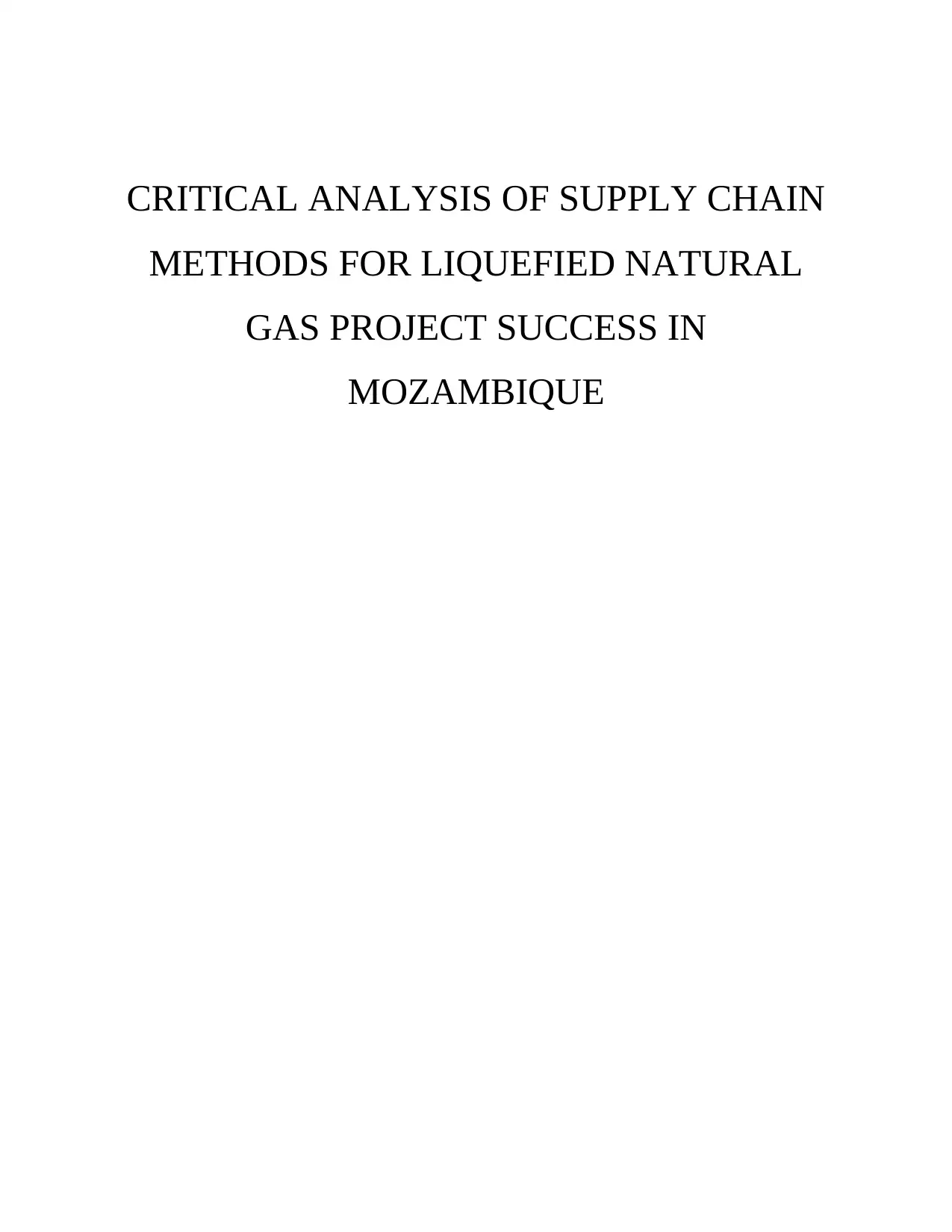
CRITICAL ANALYSIS OF SUPPLY CHAIN
METHODS FOR LIQUEFIED NATURAL
GAS PROJECT SUCCESS IN
MOZAMBIQUE
METHODS FOR LIQUEFIED NATURAL
GAS PROJECT SUCCESS IN
MOZAMBIQUE
Paraphrase This Document
Need a fresh take? Get an instant paraphrase of this document with our AI Paraphraser
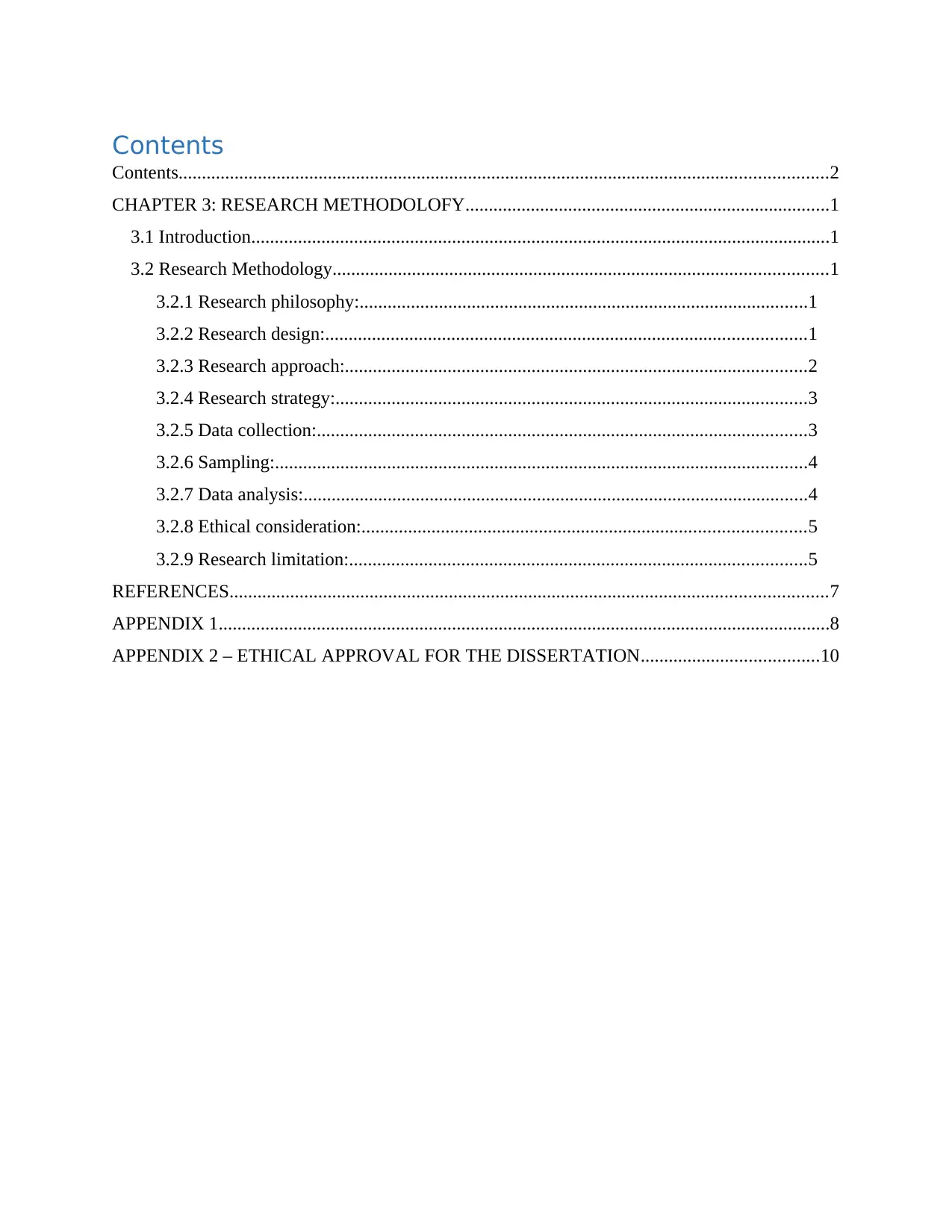
Contents
Contents...........................................................................................................................................2
CHAPTER 3: RESEARCH METHODOLOFY..............................................................................1
3.1 Introduction............................................................................................................................1
3.2 Research Methodology..........................................................................................................1
3.2.1 Research philosophy:................................................................................................1
3.2.2 Research design:.......................................................................................................1
3.2.3 Research approach:...................................................................................................2
3.2.4 Research strategy:.....................................................................................................3
3.2.5 Data collection:.........................................................................................................3
3.2.6 Sampling:..................................................................................................................4
3.2.7 Data analysis:............................................................................................................4
3.2.8 Ethical consideration:...............................................................................................5
3.2.9 Research limitation:..................................................................................................5
REFERENCES................................................................................................................................7
APPENDIX 1...................................................................................................................................8
APPENDIX 2 – ETHICAL APPROVAL FOR THE DISSERTATION......................................10
Contents...........................................................................................................................................2
CHAPTER 3: RESEARCH METHODOLOFY..............................................................................1
3.1 Introduction............................................................................................................................1
3.2 Research Methodology..........................................................................................................1
3.2.1 Research philosophy:................................................................................................1
3.2.2 Research design:.......................................................................................................1
3.2.3 Research approach:...................................................................................................2
3.2.4 Research strategy:.....................................................................................................3
3.2.5 Data collection:.........................................................................................................3
3.2.6 Sampling:..................................................................................................................4
3.2.7 Data analysis:............................................................................................................4
3.2.8 Ethical consideration:...............................................................................................5
3.2.9 Research limitation:..................................................................................................5
REFERENCES................................................................................................................................7
APPENDIX 1...................................................................................................................................8
APPENDIX 2 – ETHICAL APPROVAL FOR THE DISSERTATION......................................10
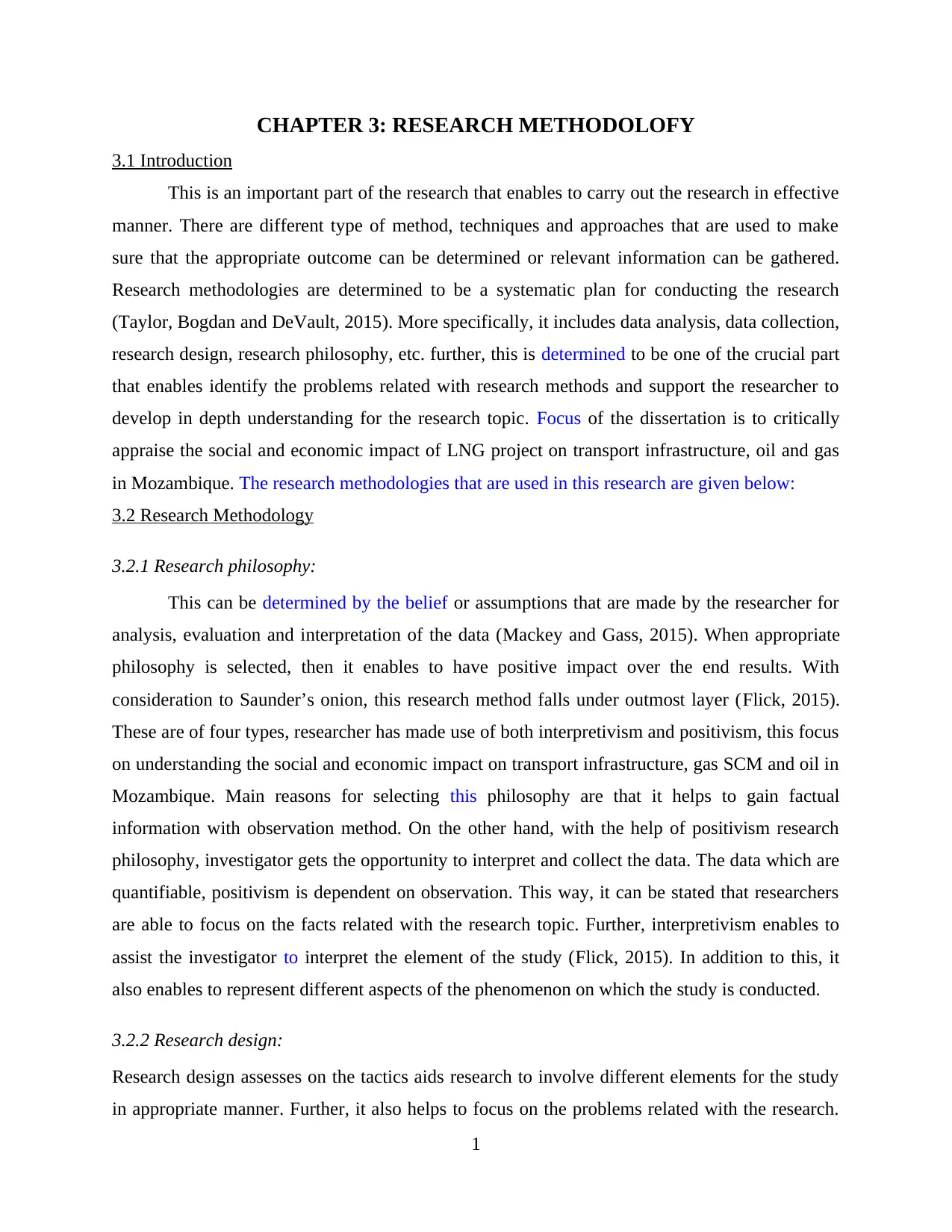
CHAPTER 3: RESEARCH METHODOLOFY
3.1 Introduction
This is an important part of the research that enables to carry out the research in effective
manner. There are different type of method, techniques and approaches that are used to make
sure that the appropriate outcome can be determined or relevant information can be gathered.
Research methodologies are determined to be a systematic plan for conducting the research
(Taylor, Bogdan and DeVault, 2015). More specifically, it includes data analysis, data collection,
research design, research philosophy, etc. further, this is determined to be one of the crucial part
that enables identify the problems related with research methods and support the researcher to
develop in depth understanding for the research topic. Focus of the dissertation is to critically
appraise the social and economic impact of LNG project on transport infrastructure, oil and gas
in Mozambique. The research methodologies that are used in this research are given below:
3.2 Research Methodology
3.2.1 Research philosophy:
This can be determined by the belief or assumptions that are made by the researcher for
analysis, evaluation and interpretation of the data (Mackey and Gass, 2015). When appropriate
philosophy is selected, then it enables to have positive impact over the end results. With
consideration to Saunder’s onion, this research method falls under outmost layer (Flick, 2015).
These are of four types, researcher has made use of both interpretivism and positivism, this focus
on understanding the social and economic impact on transport infrastructure, gas SCM and oil in
Mozambique. Main reasons for selecting this philosophy are that it helps to gain factual
information with observation method. On the other hand, with the help of positivism research
philosophy, investigator gets the opportunity to interpret and collect the data. The data which are
quantifiable, positivism is dependent on observation. This way, it can be stated that researchers
are able to focus on the facts related with the research topic. Further, interpretivism enables to
assist the investigator to interpret the element of the study (Flick, 2015). In addition to this, it
also enables to represent different aspects of the phenomenon on which the study is conducted.
3.2.2 Research design:
Research design assesses on the tactics aids research to involve different elements for the study
in appropriate manner. Further, it also helps to focus on the problems related with the research.
1
3.1 Introduction
This is an important part of the research that enables to carry out the research in effective
manner. There are different type of method, techniques and approaches that are used to make
sure that the appropriate outcome can be determined or relevant information can be gathered.
Research methodologies are determined to be a systematic plan for conducting the research
(Taylor, Bogdan and DeVault, 2015). More specifically, it includes data analysis, data collection,
research design, research philosophy, etc. further, this is determined to be one of the crucial part
that enables identify the problems related with research methods and support the researcher to
develop in depth understanding for the research topic. Focus of the dissertation is to critically
appraise the social and economic impact of LNG project on transport infrastructure, oil and gas
in Mozambique. The research methodologies that are used in this research are given below:
3.2 Research Methodology
3.2.1 Research philosophy:
This can be determined by the belief or assumptions that are made by the researcher for
analysis, evaluation and interpretation of the data (Mackey and Gass, 2015). When appropriate
philosophy is selected, then it enables to have positive impact over the end results. With
consideration to Saunder’s onion, this research method falls under outmost layer (Flick, 2015).
These are of four types, researcher has made use of both interpretivism and positivism, this focus
on understanding the social and economic impact on transport infrastructure, gas SCM and oil in
Mozambique. Main reasons for selecting this philosophy are that it helps to gain factual
information with observation method. On the other hand, with the help of positivism research
philosophy, investigator gets the opportunity to interpret and collect the data. The data which are
quantifiable, positivism is dependent on observation. This way, it can be stated that researchers
are able to focus on the facts related with the research topic. Further, interpretivism enables to
assist the investigator to interpret the element of the study (Flick, 2015). In addition to this, it
also enables to represent different aspects of the phenomenon on which the study is conducted.
3.2.2 Research design:
Research design assesses on the tactics aids research to involve different elements for the study
in appropriate manner. Further, it also helps to focus on the problems related with the research.
1
⊘ This is a preview!⊘
Do you want full access?
Subscribe today to unlock all pages.

Trusted by 1+ million students worldwide
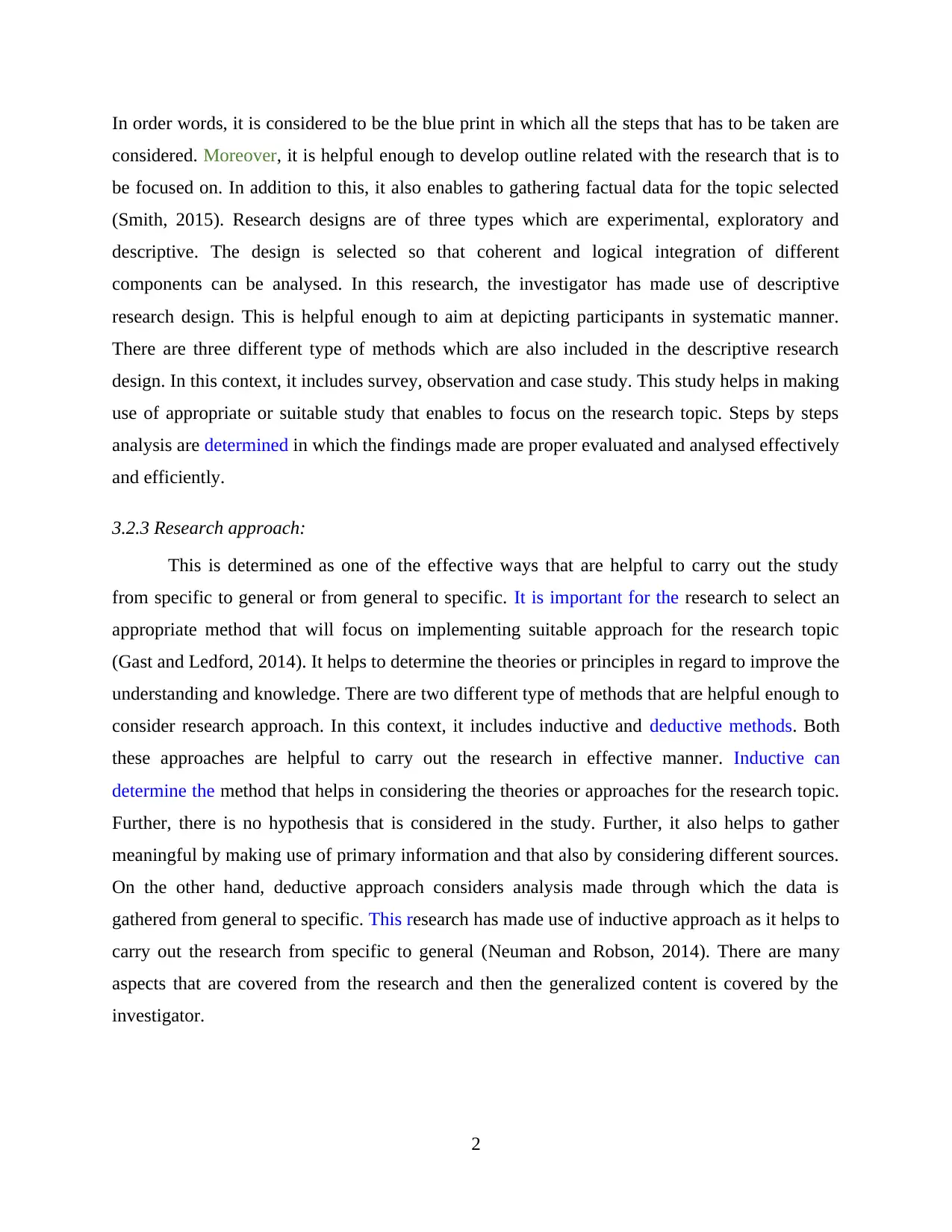
In order words, it is considered to be the blue print in which all the steps that has to be taken are
considered. Moreover, it is helpful enough to develop outline related with the research that is to
be focused on. In addition to this, it also enables to gathering factual data for the topic selected
(Smith, 2015). Research designs are of three types which are experimental, exploratory and
descriptive. The design is selected so that coherent and logical integration of different
components can be analysed. In this research, the investigator has made use of descriptive
research design. This is helpful enough to aim at depicting participants in systematic manner.
There are three different type of methods which are also included in the descriptive research
design. In this context, it includes survey, observation and case study. This study helps in making
use of appropriate or suitable study that enables to focus on the research topic. Steps by steps
analysis are determined in which the findings made are proper evaluated and analysed effectively
and efficiently.
3.2.3 Research approach:
This is determined as one of the effective ways that are helpful to carry out the study
from specific to general or from general to specific. It is important for the research to select an
appropriate method that will focus on implementing suitable approach for the research topic
(Gast and Ledford, 2014). It helps to determine the theories or principles in regard to improve the
understanding and knowledge. There are two different type of methods that are helpful enough to
consider research approach. In this context, it includes inductive and deductive methods. Both
these approaches are helpful to carry out the research in effective manner. Inductive can
determine the method that helps in considering the theories or approaches for the research topic.
Further, there is no hypothesis that is considered in the study. Further, it also helps to gather
meaningful by making use of primary information and that also by considering different sources.
On the other hand, deductive approach considers analysis made through which the data is
gathered from general to specific. This research has made use of inductive approach as it helps to
carry out the research from specific to general (Neuman and Robson, 2014). There are many
aspects that are covered from the research and then the generalized content is covered by the
investigator.
2
considered. Moreover, it is helpful enough to develop outline related with the research that is to
be focused on. In addition to this, it also enables to gathering factual data for the topic selected
(Smith, 2015). Research designs are of three types which are experimental, exploratory and
descriptive. The design is selected so that coherent and logical integration of different
components can be analysed. In this research, the investigator has made use of descriptive
research design. This is helpful enough to aim at depicting participants in systematic manner.
There are three different type of methods which are also included in the descriptive research
design. In this context, it includes survey, observation and case study. This study helps in making
use of appropriate or suitable study that enables to focus on the research topic. Steps by steps
analysis are determined in which the findings made are proper evaluated and analysed effectively
and efficiently.
3.2.3 Research approach:
This is determined as one of the effective ways that are helpful to carry out the study
from specific to general or from general to specific. It is important for the research to select an
appropriate method that will focus on implementing suitable approach for the research topic
(Gast and Ledford, 2014). It helps to determine the theories or principles in regard to improve the
understanding and knowledge. There are two different type of methods that are helpful enough to
consider research approach. In this context, it includes inductive and deductive methods. Both
these approaches are helpful to carry out the research in effective manner. Inductive can
determine the method that helps in considering the theories or approaches for the research topic.
Further, there is no hypothesis that is considered in the study. Further, it also helps to gather
meaningful by making use of primary information and that also by considering different sources.
On the other hand, deductive approach considers analysis made through which the data is
gathered from general to specific. This research has made use of inductive approach as it helps to
carry out the research from specific to general (Neuman and Robson, 2014). There are many
aspects that are covered from the research and then the generalized content is covered by the
investigator.
2
Paraphrase This Document
Need a fresh take? Get an instant paraphrase of this document with our AI Paraphraser
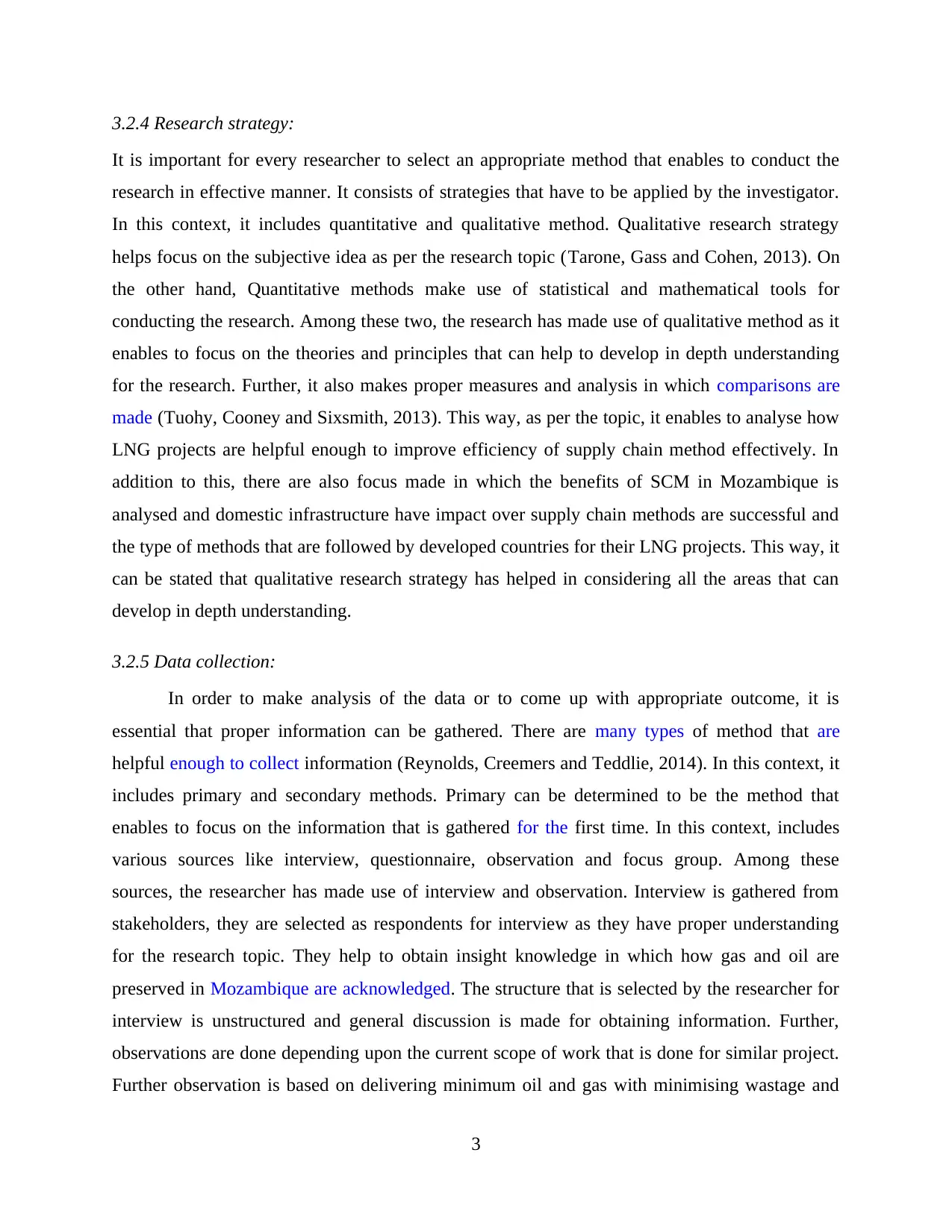
3.2.4 Research strategy:
It is important for every researcher to select an appropriate method that enables to conduct the
research in effective manner. It consists of strategies that have to be applied by the investigator.
In this context, it includes quantitative and qualitative method. Qualitative research strategy
helps focus on the subjective idea as per the research topic (Tarone, Gass and Cohen, 2013). On
the other hand, Quantitative methods make use of statistical and mathematical tools for
conducting the research. Among these two, the research has made use of qualitative method as it
enables to focus on the theories and principles that can help to develop in depth understanding
for the research. Further, it also makes proper measures and analysis in which comparisons are
made (Tuohy, Cooney and Sixsmith, 2013). This way, as per the topic, it enables to analyse how
LNG projects are helpful enough to improve efficiency of supply chain method effectively. In
addition to this, there are also focus made in which the benefits of SCM in Mozambique is
analysed and domestic infrastructure have impact over supply chain methods are successful and
the type of methods that are followed by developed countries for their LNG projects. This way, it
can be stated that qualitative research strategy has helped in considering all the areas that can
develop in depth understanding.
3.2.5 Data collection:
In order to make analysis of the data or to come up with appropriate outcome, it is
essential that proper information can be gathered. There are many types of method that are
helpful enough to collect information (Reynolds, Creemers and Teddlie, 2014). In this context, it
includes primary and secondary methods. Primary can be determined to be the method that
enables to focus on the information that is gathered for the first time. In this context, includes
various sources like interview, questionnaire, observation and focus group. Among these
sources, the researcher has made use of interview and observation. Interview is gathered from
stakeholders, they are selected as respondents for interview as they have proper understanding
for the research topic. They help to obtain insight knowledge in which how gas and oil are
preserved in Mozambique are acknowledged. The structure that is selected by the researcher for
interview is unstructured and general discussion is made for obtaining information. Further,
observations are done depending upon the current scope of work that is done for similar project.
Further observation is based on delivering minimum oil and gas with minimising wastage and
3
It is important for every researcher to select an appropriate method that enables to conduct the
research in effective manner. It consists of strategies that have to be applied by the investigator.
In this context, it includes quantitative and qualitative method. Qualitative research strategy
helps focus on the subjective idea as per the research topic (Tarone, Gass and Cohen, 2013). On
the other hand, Quantitative methods make use of statistical and mathematical tools for
conducting the research. Among these two, the research has made use of qualitative method as it
enables to focus on the theories and principles that can help to develop in depth understanding
for the research. Further, it also makes proper measures and analysis in which comparisons are
made (Tuohy, Cooney and Sixsmith, 2013). This way, as per the topic, it enables to analyse how
LNG projects are helpful enough to improve efficiency of supply chain method effectively. In
addition to this, there are also focus made in which the benefits of SCM in Mozambique is
analysed and domestic infrastructure have impact over supply chain methods are successful and
the type of methods that are followed by developed countries for their LNG projects. This way, it
can be stated that qualitative research strategy has helped in considering all the areas that can
develop in depth understanding.
3.2.5 Data collection:
In order to make analysis of the data or to come up with appropriate outcome, it is
essential that proper information can be gathered. There are many types of method that are
helpful enough to collect information (Reynolds, Creemers and Teddlie, 2014). In this context, it
includes primary and secondary methods. Primary can be determined to be the method that
enables to focus on the information that is gathered for the first time. In this context, includes
various sources like interview, questionnaire, observation and focus group. Among these
sources, the researcher has made use of interview and observation. Interview is gathered from
stakeholders, they are selected as respondents for interview as they have proper understanding
for the research topic. They help to obtain insight knowledge in which how gas and oil are
preserved in Mozambique are acknowledged. The structure that is selected by the researcher for
interview is unstructured and general discussion is made for obtaining information. Further,
observations are done depending upon the current scope of work that is done for similar project.
Further observation is based on delivering minimum oil and gas with minimising wastage and
3
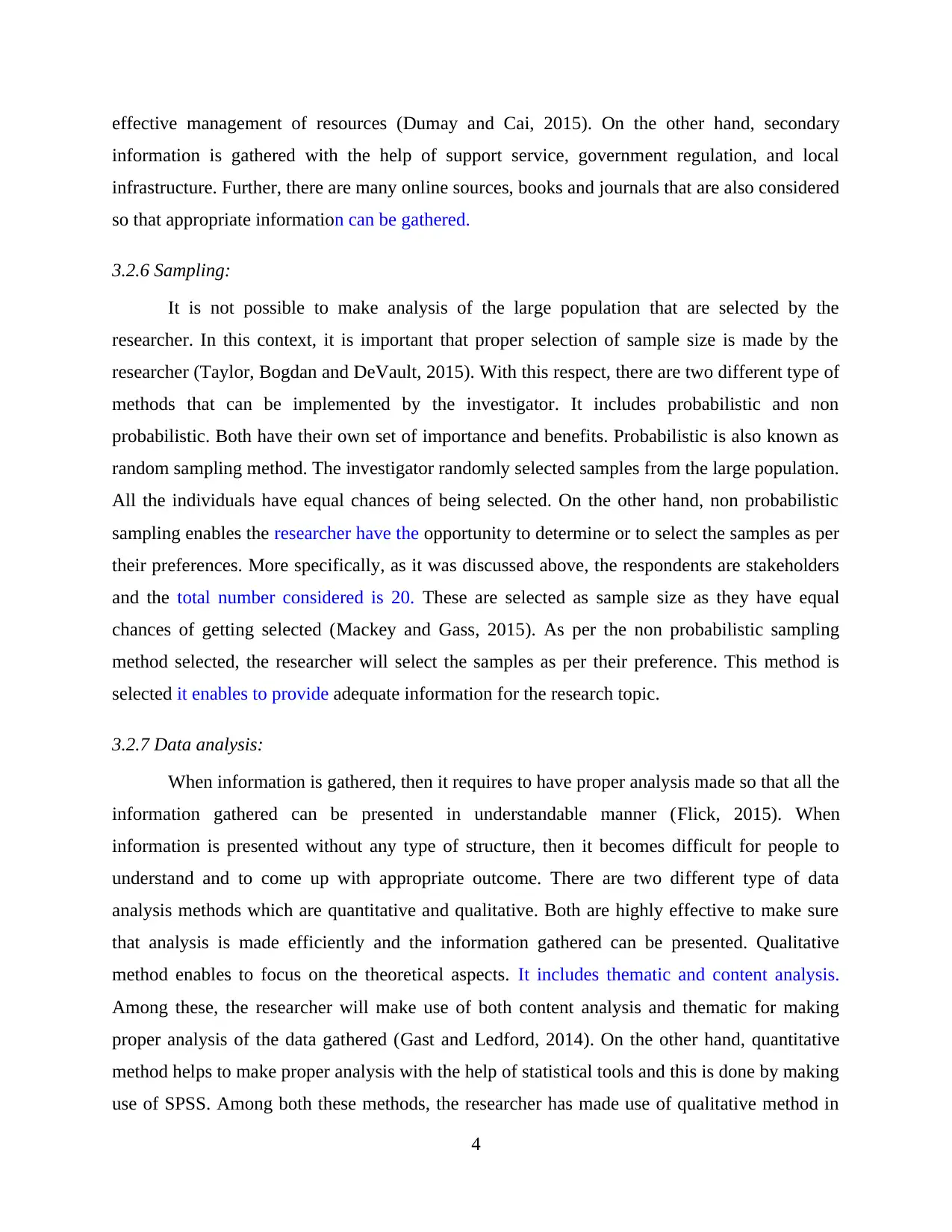
effective management of resources (Dumay and Cai, 2015). On the other hand, secondary
information is gathered with the help of support service, government regulation, and local
infrastructure. Further, there are many online sources, books and journals that are also considered
so that appropriate information can be gathered.
3.2.6 Sampling:
It is not possible to make analysis of the large population that are selected by the
researcher. In this context, it is important that proper selection of sample size is made by the
researcher (Taylor, Bogdan and DeVault, 2015). With this respect, there are two different type of
methods that can be implemented by the investigator. It includes probabilistic and non
probabilistic. Both have their own set of importance and benefits. Probabilistic is also known as
random sampling method. The investigator randomly selected samples from the large population.
All the individuals have equal chances of being selected. On the other hand, non probabilistic
sampling enables the researcher have the opportunity to determine or to select the samples as per
their preferences. More specifically, as it was discussed above, the respondents are stakeholders
and the total number considered is 20. These are selected as sample size as they have equal
chances of getting selected (Mackey and Gass, 2015). As per the non probabilistic sampling
method selected, the researcher will select the samples as per their preference. This method is
selected it enables to provide adequate information for the research topic.
3.2.7 Data analysis:
When information is gathered, then it requires to have proper analysis made so that all the
information gathered can be presented in understandable manner (Flick, 2015). When
information is presented without any type of structure, then it becomes difficult for people to
understand and to come up with appropriate outcome. There are two different type of data
analysis methods which are quantitative and qualitative. Both are highly effective to make sure
that analysis is made efficiently and the information gathered can be presented. Qualitative
method enables to focus on the theoretical aspects. It includes thematic and content analysis.
Among these, the researcher will make use of both content analysis and thematic for making
proper analysis of the data gathered (Gast and Ledford, 2014). On the other hand, quantitative
method helps to make proper analysis with the help of statistical tools and this is done by making
use of SPSS. Among both these methods, the researcher has made use of qualitative method in
4
information is gathered with the help of support service, government regulation, and local
infrastructure. Further, there are many online sources, books and journals that are also considered
so that appropriate information can be gathered.
3.2.6 Sampling:
It is not possible to make analysis of the large population that are selected by the
researcher. In this context, it is important that proper selection of sample size is made by the
researcher (Taylor, Bogdan and DeVault, 2015). With this respect, there are two different type of
methods that can be implemented by the investigator. It includes probabilistic and non
probabilistic. Both have their own set of importance and benefits. Probabilistic is also known as
random sampling method. The investigator randomly selected samples from the large population.
All the individuals have equal chances of being selected. On the other hand, non probabilistic
sampling enables the researcher have the opportunity to determine or to select the samples as per
their preferences. More specifically, as it was discussed above, the respondents are stakeholders
and the total number considered is 20. These are selected as sample size as they have equal
chances of getting selected (Mackey and Gass, 2015). As per the non probabilistic sampling
method selected, the researcher will select the samples as per their preference. This method is
selected it enables to provide adequate information for the research topic.
3.2.7 Data analysis:
When information is gathered, then it requires to have proper analysis made so that all the
information gathered can be presented in understandable manner (Flick, 2015). When
information is presented without any type of structure, then it becomes difficult for people to
understand and to come up with appropriate outcome. There are two different type of data
analysis methods which are quantitative and qualitative. Both are highly effective to make sure
that analysis is made efficiently and the information gathered can be presented. Qualitative
method enables to focus on the theoretical aspects. It includes thematic and content analysis.
Among these, the researcher will make use of both content analysis and thematic for making
proper analysis of the data gathered (Gast and Ledford, 2014). On the other hand, quantitative
method helps to make proper analysis with the help of statistical tools and this is done by making
use of SPSS. Among both these methods, the researcher has made use of qualitative method in
4
⊘ This is a preview!⊘
Do you want full access?
Subscribe today to unlock all pages.

Trusted by 1+ million students worldwide
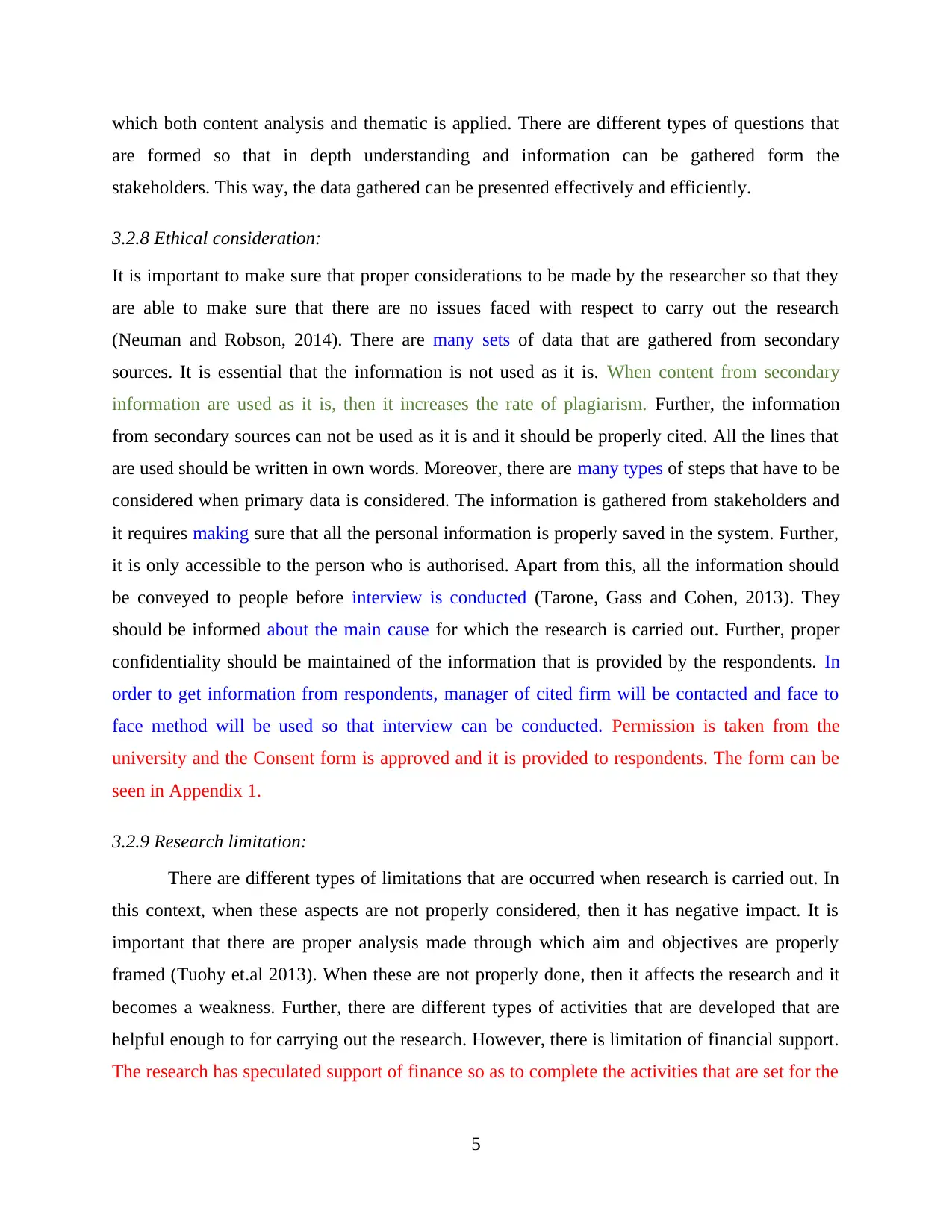
which both content analysis and thematic is applied. There are different types of questions that
are formed so that in depth understanding and information can be gathered form the
stakeholders. This way, the data gathered can be presented effectively and efficiently.
3.2.8 Ethical consideration:
It is important to make sure that proper considerations to be made by the researcher so that they
are able to make sure that there are no issues faced with respect to carry out the research
(Neuman and Robson, 2014). There are many sets of data that are gathered from secondary
sources. It is essential that the information is not used as it is. When content from secondary
information are used as it is, then it increases the rate of plagiarism. Further, the information
from secondary sources can not be used as it is and it should be properly cited. All the lines that
are used should be written in own words. Moreover, there are many types of steps that have to be
considered when primary data is considered. The information is gathered from stakeholders and
it requires making sure that all the personal information is properly saved in the system. Further,
it is only accessible to the person who is authorised. Apart from this, all the information should
be conveyed to people before interview is conducted (Tarone, Gass and Cohen, 2013). They
should be informed about the main cause for which the research is carried out. Further, proper
confidentiality should be maintained of the information that is provided by the respondents. In
order to get information from respondents, manager of cited firm will be contacted and face to
face method will be used so that interview can be conducted. Permission is taken from the
university and the Consent form is approved and it is provided to respondents. The form can be
seen in Appendix 1.
3.2.9 Research limitation:
There are different types of limitations that are occurred when research is carried out. In
this context, when these aspects are not properly considered, then it has negative impact. It is
important that there are proper analysis made through which aim and objectives are properly
framed (Tuohy et.al 2013). When these are not properly done, then it affects the research and it
becomes a weakness. Further, there are different types of activities that are developed that are
helpful enough to for carrying out the research. However, there is limitation of financial support.
The research has speculated support of finance so as to complete the activities that are set for the
5
are formed so that in depth understanding and information can be gathered form the
stakeholders. This way, the data gathered can be presented effectively and efficiently.
3.2.8 Ethical consideration:
It is important to make sure that proper considerations to be made by the researcher so that they
are able to make sure that there are no issues faced with respect to carry out the research
(Neuman and Robson, 2014). There are many sets of data that are gathered from secondary
sources. It is essential that the information is not used as it is. When content from secondary
information are used as it is, then it increases the rate of plagiarism. Further, the information
from secondary sources can not be used as it is and it should be properly cited. All the lines that
are used should be written in own words. Moreover, there are many types of steps that have to be
considered when primary data is considered. The information is gathered from stakeholders and
it requires making sure that all the personal information is properly saved in the system. Further,
it is only accessible to the person who is authorised. Apart from this, all the information should
be conveyed to people before interview is conducted (Tarone, Gass and Cohen, 2013). They
should be informed about the main cause for which the research is carried out. Further, proper
confidentiality should be maintained of the information that is provided by the respondents. In
order to get information from respondents, manager of cited firm will be contacted and face to
face method will be used so that interview can be conducted. Permission is taken from the
university and the Consent form is approved and it is provided to respondents. The form can be
seen in Appendix 1.
3.2.9 Research limitation:
There are different types of limitations that are occurred when research is carried out. In
this context, when these aspects are not properly considered, then it has negative impact. It is
important that there are proper analysis made through which aim and objectives are properly
framed (Tuohy et.al 2013). When these are not properly done, then it affects the research and it
becomes a weakness. Further, there are different types of activities that are developed that are
helpful enough to for carrying out the research. However, there is limitation of financial support.
The research has speculated support of finance so as to complete the activities that are set for the
5
Paraphrase This Document
Need a fresh take? Get an instant paraphrase of this document with our AI Paraphraser

research. In addition to this, there are limitation of time, it is important that time is properly
divided so that within the speculated time all the activities are completed.
6
divided so that within the speculated time all the activities are completed.
6
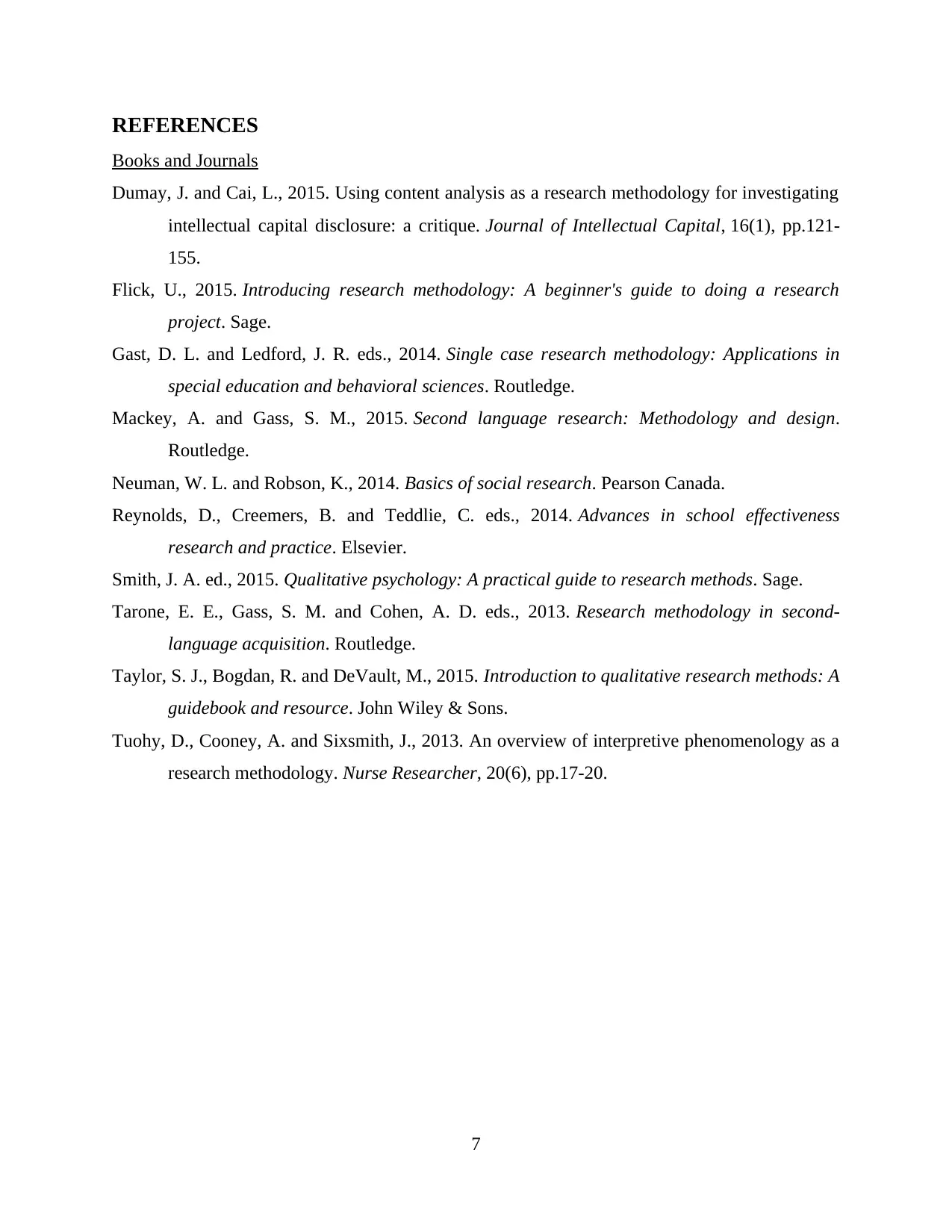
REFERENCES
Books and Journals
Dumay, J. and Cai, L., 2015. Using content analysis as a research methodology for investigating
intellectual capital disclosure: a critique. Journal of Intellectual Capital, 16(1), pp.121-
155.
Flick, U., 2015. Introducing research methodology: A beginner's guide to doing a research
project. Sage.
Gast, D. L. and Ledford, J. R. eds., 2014. Single case research methodology: Applications in
special education and behavioral sciences. Routledge.
Mackey, A. and Gass, S. M., 2015. Second language research: Methodology and design.
Routledge.
Neuman, W. L. and Robson, K., 2014. Basics of social research. Pearson Canada.
Reynolds, D., Creemers, B. and Teddlie, C. eds., 2014. Advances in school effectiveness
research and practice. Elsevier.
Smith, J. A. ed., 2015. Qualitative psychology: A practical guide to research methods. Sage.
Tarone, E. E., Gass, S. M. and Cohen, A. D. eds., 2013. Research methodology in second-
language acquisition. Routledge.
Taylor, S. J., Bogdan, R. and DeVault, M., 2015. Introduction to qualitative research methods: A
guidebook and resource. John Wiley & Sons.
Tuohy, D., Cooney, A. and Sixsmith, J., 2013. An overview of interpretive phenomenology as a
research methodology. Nurse Researcher, 20(6), pp.17-20.
7
Books and Journals
Dumay, J. and Cai, L., 2015. Using content analysis as a research methodology for investigating
intellectual capital disclosure: a critique. Journal of Intellectual Capital, 16(1), pp.121-
155.
Flick, U., 2015. Introducing research methodology: A beginner's guide to doing a research
project. Sage.
Gast, D. L. and Ledford, J. R. eds., 2014. Single case research methodology: Applications in
special education and behavioral sciences. Routledge.
Mackey, A. and Gass, S. M., 2015. Second language research: Methodology and design.
Routledge.
Neuman, W. L. and Robson, K., 2014. Basics of social research. Pearson Canada.
Reynolds, D., Creemers, B. and Teddlie, C. eds., 2014. Advances in school effectiveness
research and practice. Elsevier.
Smith, J. A. ed., 2015. Qualitative psychology: A practical guide to research methods. Sage.
Tarone, E. E., Gass, S. M. and Cohen, A. D. eds., 2013. Research methodology in second-
language acquisition. Routledge.
Taylor, S. J., Bogdan, R. and DeVault, M., 2015. Introduction to qualitative research methods: A
guidebook and resource. John Wiley & Sons.
Tuohy, D., Cooney, A. and Sixsmith, J., 2013. An overview of interpretive phenomenology as a
research methodology. Nurse Researcher, 20(6), pp.17-20.
7
⊘ This is a preview!⊘
Do you want full access?
Subscribe today to unlock all pages.

Trusted by 1+ million students worldwide

APPENDIX 1
Consent Form for Interviews:
Thank you for reading the information sheet about the interview. If you are happy to participate then
please complete and sign the form below. Please initial the boxes below to confirm that you agree with
each statement:
Please
Initial box:
I confirm that I have read and understood the information sheet dated
[20/11/2017] and have had the opportunity to ask questions.
I understand that my participation is voluntary and that I am free to withdraw at
any time without giving any reason and without there being any negative
consequences. In addition, should I not wish to answer any particular question or
questions, I am free to decline.
I understand that my responses will be kept strictly confidential. I understand
that my name will not be linked with the research materials, and will not be
identified or identifiable in the report or reports that result from the research.
I agree for this interview to be tape-recorded. I understand that the audio
recording made of this interview will be used only for analysis and that extracts
from the interview, from which I would not be personally identified, may be
used in any conference presentation, report or journal article developed as a
result of the research. I understand that no other use will be made of the
recording without my written permission, and that no one outside the research
team will be allowed access to the original recording.
I agree that my anonymised data will be kept for future research purposes such as
publications related to this study after the completion of the study.
8
Consent Form for Interviews:
Thank you for reading the information sheet about the interview. If you are happy to participate then
please complete and sign the form below. Please initial the boxes below to confirm that you agree with
each statement:
Please
Initial box:
I confirm that I have read and understood the information sheet dated
[20/11/2017] and have had the opportunity to ask questions.
I understand that my participation is voluntary and that I am free to withdraw at
any time without giving any reason and without there being any negative
consequences. In addition, should I not wish to answer any particular question or
questions, I am free to decline.
I understand that my responses will be kept strictly confidential. I understand
that my name will not be linked with the research materials, and will not be
identified or identifiable in the report or reports that result from the research.
I agree for this interview to be tape-recorded. I understand that the audio
recording made of this interview will be used only for analysis and that extracts
from the interview, from which I would not be personally identified, may be
used in any conference presentation, report or journal article developed as a
result of the research. I understand that no other use will be made of the
recording without my written permission, and that no one outside the research
team will be allowed access to the original recording.
I agree that my anonymised data will be kept for future research purposes such as
publications related to this study after the completion of the study.
8
Paraphrase This Document
Need a fresh take? Get an instant paraphrase of this document with our AI Paraphraser
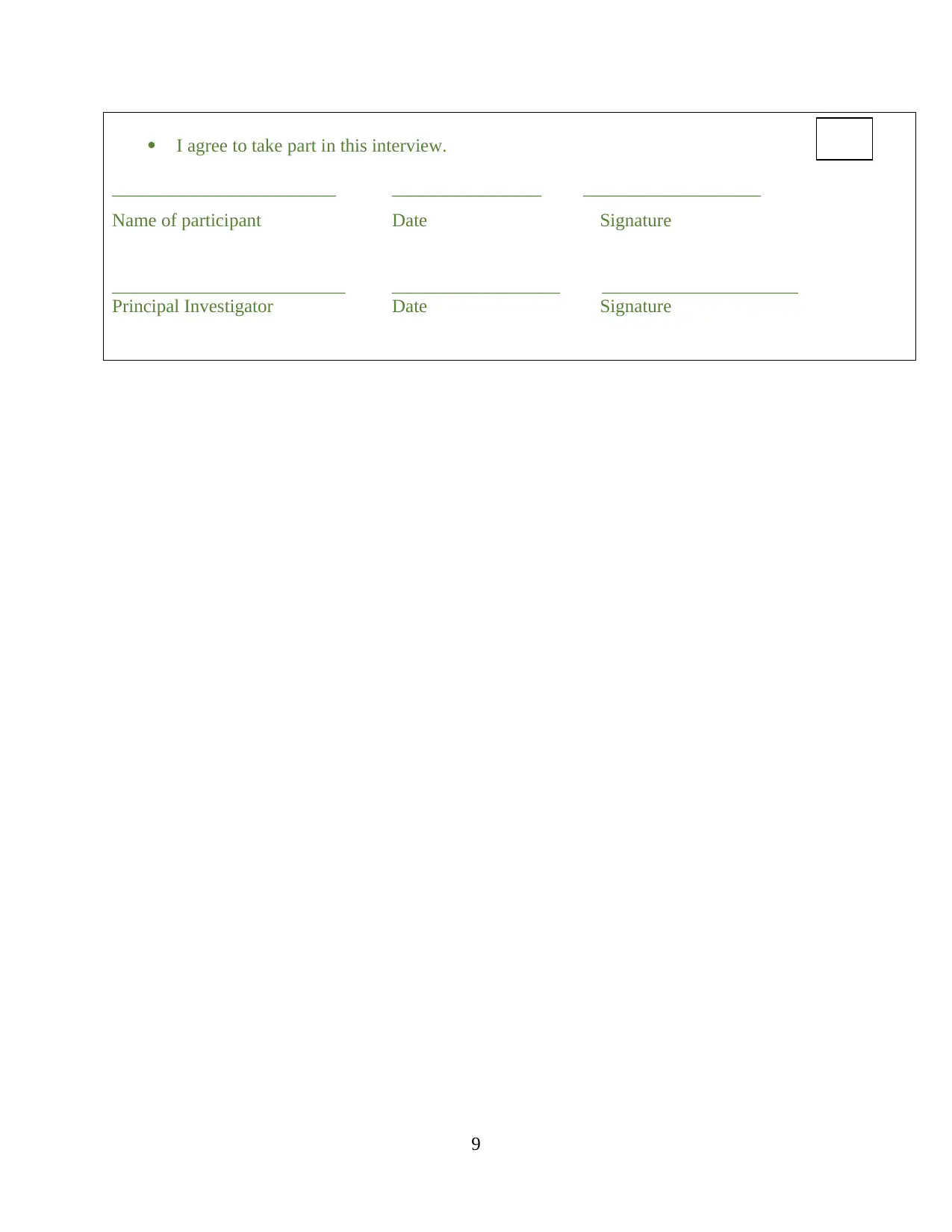
I agree to take part in this interview.
________________________ ________________ ___________________
Name of participant Date Signature
_________________________ __________________ _____________________
Principal Investigator Date Signature
9
________________________ ________________ ___________________
Name of participant Date Signature
_________________________ __________________ _____________________
Principal Investigator Date Signature
9
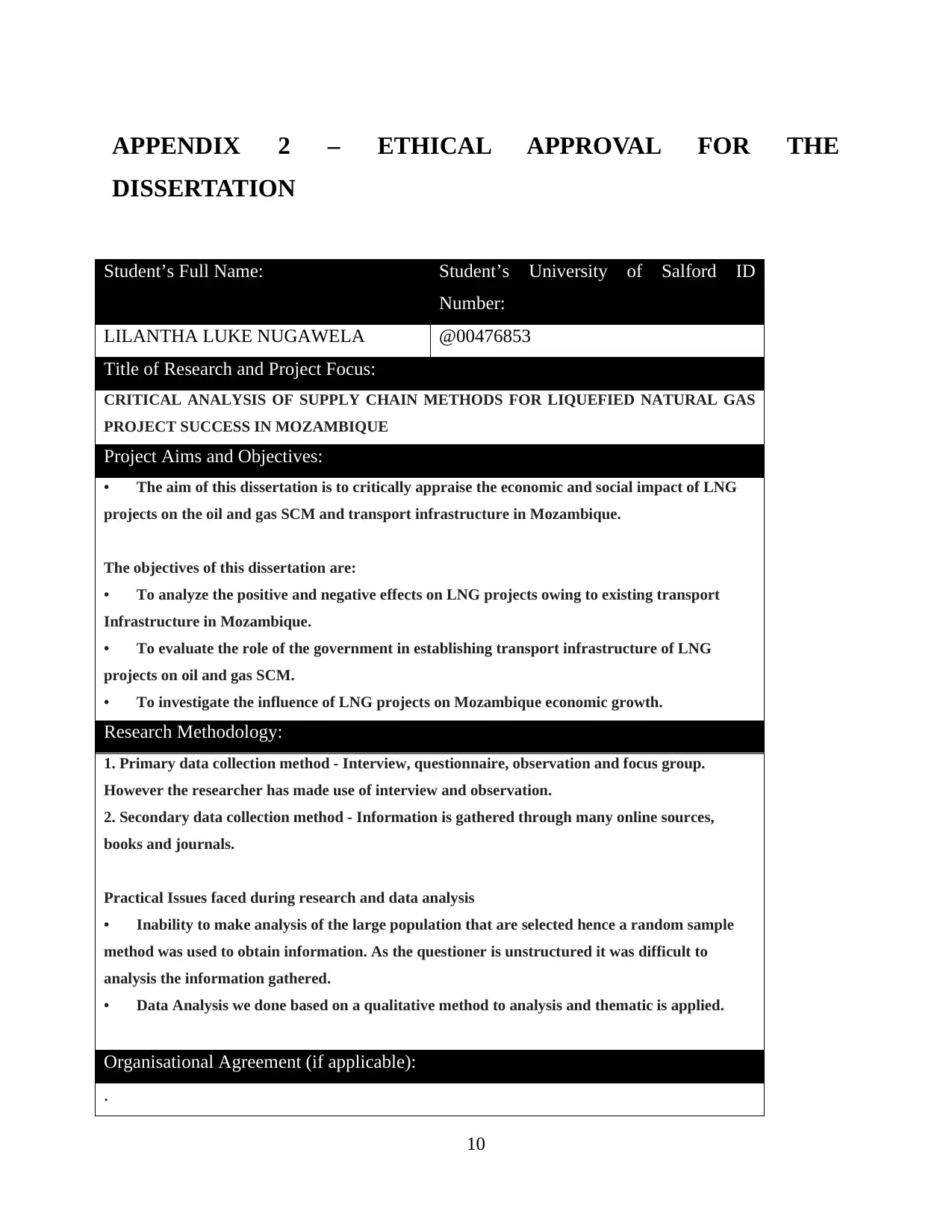
APPENDIX 2 – ETHICAL APPROVAL FOR THE
DISSERTATION
Student’s Full Name: Student’s University of Salford ID
Number:
LILANTHA LUKE NUGAWELA @00476853
Title of Research and Project Focus:
CRITICAL ANALYSIS OF SUPPLY CHAIN METHODS FOR LIQUEFIED NATURAL GAS
PROJECT SUCCESS IN MOZAMBIQUE
Project Aims and Objectives:
• The aim of this dissertation is to critically appraise the economic and social impact of LNG
projects on the oil and gas SCM and transport infrastructure in Mozambique.
The objectives of this dissertation are:
• To analyze the positive and negative effects on LNG projects owing to existing transport
Infrastructure in Mozambique.
• To evaluate the role of the government in establishing transport infrastructure of LNG
projects on oil and gas SCM.
• To investigate the influence of LNG projects on Mozambique economic growth.
Research Methodology:
1. Primary data collection method - Interview, questionnaire, observation and focus group.
However the researcher has made use of interview and observation.
2. Secondary data collection method - Information is gathered through many online sources,
books and journals.
Practical Issues faced during research and data analysis
• Inability to make analysis of the large population that are selected hence a random sample
method was used to obtain information. As the questioner is unstructured it was difficult to
analysis the information gathered.
• Data Analysis we done based on a qualitative method to analysis and thematic is applied.
Organisational Agreement (if applicable):
.
10
DISSERTATION
Student’s Full Name: Student’s University of Salford ID
Number:
LILANTHA LUKE NUGAWELA @00476853
Title of Research and Project Focus:
CRITICAL ANALYSIS OF SUPPLY CHAIN METHODS FOR LIQUEFIED NATURAL GAS
PROJECT SUCCESS IN MOZAMBIQUE
Project Aims and Objectives:
• The aim of this dissertation is to critically appraise the economic and social impact of LNG
projects on the oil and gas SCM and transport infrastructure in Mozambique.
The objectives of this dissertation are:
• To analyze the positive and negative effects on LNG projects owing to existing transport
Infrastructure in Mozambique.
• To evaluate the role of the government in establishing transport infrastructure of LNG
projects on oil and gas SCM.
• To investigate the influence of LNG projects on Mozambique economic growth.
Research Methodology:
1. Primary data collection method - Interview, questionnaire, observation and focus group.
However the researcher has made use of interview and observation.
2. Secondary data collection method - Information is gathered through many online sources,
books and journals.
Practical Issues faced during research and data analysis
• Inability to make analysis of the large population that are selected hence a random sample
method was used to obtain information. As the questioner is unstructured it was difficult to
analysis the information gathered.
• Data Analysis we done based on a qualitative method to analysis and thematic is applied.
Organisational Agreement (if applicable):
.
10
⊘ This is a preview!⊘
Do you want full access?
Subscribe today to unlock all pages.

Trusted by 1+ million students worldwide
1 out of 14
Related Documents
Your All-in-One AI-Powered Toolkit for Academic Success.
+13062052269
info@desklib.com
Available 24*7 on WhatsApp / Email
![[object Object]](/_next/static/media/star-bottom.7253800d.svg)
Unlock your academic potential
Copyright © 2020–2025 A2Z Services. All Rights Reserved. Developed and managed by ZUCOL.





